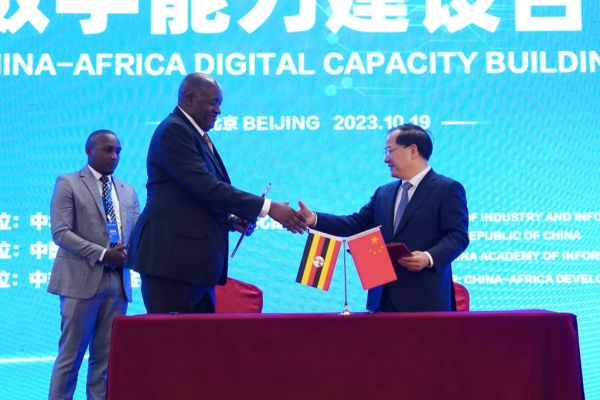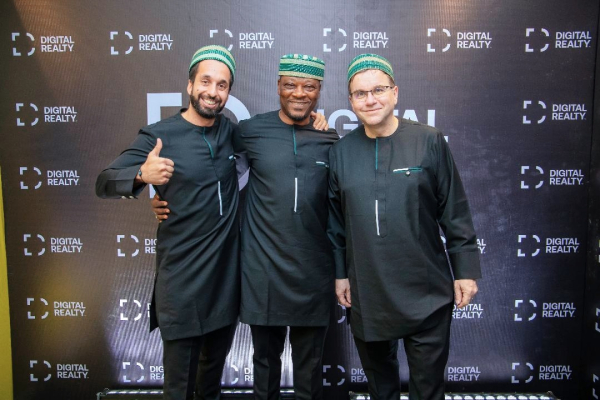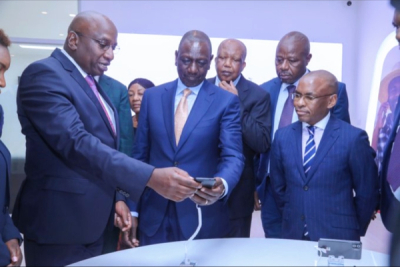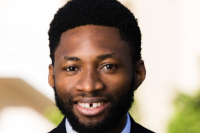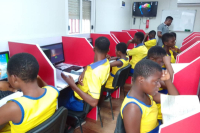African countries need reliable internet connections to achieve the objectives set out in their respective digital transformation agendas. Consequently, the need for these countries to collaborate with partners capable of bolstering their ambitions has become increasingly imperative.
On the sidelines of the China-Africa Digital Capacity Building Cooperation, Uganda signed an agreement with China to enhance connectivity nationwide.
Commenting on the new collaboration, the country’s ICT Minister, Chris Baryomunsi, said that it would help build the infrastructure needed to ensure internet access for the whole country.
"China is ahead of us in terms of technology and has been a key pillar in connecting internet cables to different parts of the country. Through this cooperation, we shall build new infrastructure, equipment, and training and provide services to all Ugandans," said Chris Baryomunsi.
This new initiative is part of the Ugandan government's ambition to accelerate digital transformation to support economic recovery, create unlimited opportunities for youth, and achieve "Vision 2040". Last March, the executive secured 1,800 billion shillings (477.4 million USD) in funding from the World Bank to expand Internet access in the country.
At the end of this partnership, which is already being implemented, Uganda will benefit from improved Internet connectivity coverage at affordable costs. The partnership will also enable people in remote areas to familiarize themselves with the public services set up by the government via digital platforms.
Samira Noya
Digital Realty aims to position itself as one of the most important data providers on the African continent. To achieve this, management is making strategic decisions.
Medallion Data Centres, a Nigerian data center provider, has been renamed Digital Realty, after its parent company. The name was officialized at a ceremony held in Lagos on Friday, October 27.
"We have made a strategic decision to align with Digital Reality and we are proud to be part of one of America’s largest Public Companies. For over a decade, we have been at the forefront of the Nigerian digital economy through the provisioning of carrier-neutral data center services in both Lagos and Abuja," said Ikechukwu Nnamani (photo, center), founder of Medallion Data Centres.
The Nigerian data center provider entered Digital Realty’s portfolio in 2021. At the time, the American firm, which owns over 300 facilities in more than 50 cities worldwide, decided to finance the Nigerian firm’s expansion on the continent with a $500 million package. Before this name change, Medallion Data Centres inaugurated a new data center in the city of Lagos on October 24 to expand its capacities.
"We are going to take advantage of the huge opportunity to both meet growing customer demand for connectivity in Africa and improve the internet infrastructure that serves over one billion people who don’t yet have proper access to the benefits of the Internet," said Mike Hollands (photo, right), Digital Realty's Vice President for Market Development.
Adoni Conrad Quenum
In Africa, digital transformation is accelerating across all countries. However, some countries are more focused on quickly achieving their digital goals than others. In Rwanda for instance, the government is hard at work to complete some of its digital projects by 2024.
The Rwandan government will soon launch a unique digital identification system (SDID) and deploy 5th generation (5G) technology in the country. Rwanda's Minister of ICT and Innovation, Paula Ingabire, confirmed this recently in a podcast produced by the private Rwandan newspaper, The New Times.
"We’ll start very soon with what we call the pre-enrolment phase which is about enrolling citizens and getting their biometrics. The current ID that we have is given only to people who are 16 years and above, but we’ll provide the digital ID from birth. That’s one exciting aspect of the digital ID," she said.
The new system, which is currently being rolled out, is financed to the tune of $40 million by the World Bank. It will be based on a national population register containing the biographical and biometric data of all Rwandan citizens, including those from the diaspora and foreigners living in the country.
During the same broadcast, the Minister also mentioned that the first 5G tests were recently successfully carried out in the country from the stratosphere using a prototype unmanned aerial vehicle (HAPS). During the test, 5G connectivity was provided for around 73 minutes at a maximum altitude of 16.9 km, ts2.space reveals. These ongoing initiatives, among others, are part of the Rwandan government's commitment to enhancing public service delivery across diverse sectors. They aim to expand internet accessibility across the nation, encompassing even remote rural communities, and providing an identity to every citizen.
Samira Njoya
Harhub is a community that fosters collaboration and innovation. It offers appropriate entrepreneurial training to young people as well as incubation services, mentoring, coaching, and technical assistance to entrepreneurs.
Hargeisa Hub (Harhub) is an innovation, co-working, and training space that supports entrepreneurs and innovators in Africa. Founded in 2018 by the Shaqodoon organization and led by Mahamoud Batalaale, an investment and business development specialist, it aims to reduce youth unemployment in Somaliland.
HarHub establishes incubation and acceleration initiatives tailored for young entrepreneurs, assisting them in refining their products, penetrating new markets, validating their concepts, and fostering expansion. Its flagship incubation program, Harhub Business Incubation, is designed to provide entrepreneurs and digital nomads with a secure space to foster startup growth and sustainability. It also encourages collaboration between entrepreneurs, through its coworking space. Participants in its programs gain access to a diverse network of global specialists.
The center is also developing training and investment programs to provide high-quality training and unique access to finance for startups and small and medium-sized enterprises in the early stages. The initiative aims to empower young, innovative entrepreneurs from low-income backgrounds, enabling them to independently establish their ventures.
Through its acceleration program, it helps young companies to develop, expand, and penetrate new markets. Harhub accepts all types of innovative businesses but, it mainly focuses on companies in the agriculture, livestock, energy, and technology sectors.
Harhub operates multiple venues dedicated to hosting events and meetings focused on digital innovation, entrepreneurship, and social progress. These events include the Startup Huddle, which brings together budding and emerging entrepreneurs, businesses, and consultants from Somaliland. The latter can be defined as a networking event that facilitates relations between entrepreneurs.
A member of the AfriLabs network, it is supported by UNDP, Crosswise Works, and Oxfam, among others. In terms of impact, Harhub has received 2,805 applications, invested in 124 startups, trained 520 young people, created 161 jobs, incubated 61 start-ups, organized 120 networking events, and mentored 146 young people. These statistics testify to Harhub's significant impact on the local entrepreneurial ecosystem.
Melchior Koba
Cathy Chepkemboi is an enthusiastic entrepreneur dedicated to driving technological innovation in Africa. As the founder of Tushop, she has distinguished herself by delivering high-quality and practical solutions to Kenyan communities.
Cathy Chepkemboi (photo) is the founder and CEO of Tushop, a social commerce platform that enables group purchasing of fast-moving consumer goods (FMCG). Originally from Kenya, she graduated from the University of Pennsylvania in 2013 with a Bachelor's degree in International Relations.
In 2021, she launched Tushop, a platform that consolidates grocery orders within communities, securing wholesale prices for buyers and ensuring hassle-free last-mile delivery. Tushop aims to meet the growing demand for e-commerce services in Kenya and redefine the online shopping experience. It strives to deliver top-notch products at budget-friendly rates while establishing seamless connections between wholesalers and consumers.
Under the leadership of Cathy Chepkemboi, Tushop has enjoyed considerable success. In 2021, the company was selected for the "The Future is Female" mentoring program run by C. Moore Media International Public Relations (CMM) for African female tech founders.
In June 2023, Tushop was also selected for Google for Startups' Black Founders Fund in Africa, receiving up to $150,000 in non-dilutive grants, up to $200,000 in Google Cloud credits, advertising support, one-to-one mentoring by industry experts and invaluable connections within the Google network.
Cathy Chepkemboi's professional career began in 2014 at Unilever, where she was hired as Brand Assistant for Royco, a food company operating in the Kenyan market. Subsequently, she assumed roles such as Buying Marketing Analyst in the UK in 2016 and in Kenya from August 2017 to March 2018, along with a stint as Sales Manager in Kenya from January to July 2017. In 2018, she transitioned to Moko, a leading home furnishing product manufacturer and retailer, taking on the role of Head of Brand, Marketing, and Product Development until 2019.
Melchior Koba
Last May, the Kenyan Minister of ICT revealed the government's intention to offer locally assembled smartphones for sale. A few months later, thanks to a public-private partnership, the project is becoming a reality.
On Monday, October 30, Kenyan President William Ruto (photo, center) officially launched East Africa Device Assembly Kenya (EADAK), a low-cost smartphone assembly plant located in the town of Athi River. The fruit of a partnership between the government, private telecommunications companies Safaricom and Jamii, and Chinese firm Shenzhen TeleOne Technology, EADAK is expected to assemble between 1.2 and 1.4 million smartphones each year.
They will be available nationwide in the stores of the two local private partners and on the Masoko e-commerce platform.
"The EADAK-assembled smartphone will cost about Sh7,500 and comes with pre-installed e-Citizen to enable more Kenyans to access government services easily [...] We have the benefit of both cheaper devices, approximately 30 percent less, compared to imports and creating jobs locally. The EADAK plant currently employs 300 people," says President William Ruto.
The move is part of the government's drive to accelerate Kenya's digital transformation. Earlier this year, President Ruto secured $390 million in funding from the World Bank to implement various projects aimed at accelerating the digital economy. With EADAK, the Kenyan authorities aim to facilitate access to ICT gadgets for people in a country with 29.7 million active smartphones, which represents 46.9% of the 63.3 million cell phones connected to the network, according to the Communications Authority.
"The launch of EADAK reaffirms our belief in the power of connectivity to transform lives and drive economic progress. [...] This partnership underscores our relentless pursuit to expand 4G access and empower Kenyans through affordable, high-quality smartphones, create employment opportunities, and grow our economy," said Safaricom CEO Peter Ndegwa (photo, right).
Adoni Conrad Quenum
In Africa, many startups are focused on improving financial inclusion. They have developed many fintech solutions, some more innovative than others.
Babimo is a fintech solution developed by an Ivorian startup. It enables users to pay bills online using a contactless QR code. The Abidjan-based startup was founded in 2021 by El Mehdi Messek.
The solution features a mobile app accessible on iOS and Android. Through the app, a user can create an account, with a phone number and a PIN code, and access the various services. In addition to paying bills online using the QR code, users can transfer money to their contacts via the Moov Africa, MTN, or Orange mobile networks, or buy airtime.
Babimo's digital wallet can be topped up by mobile money for various commercial transactions. It is worth mentioning that the startup collects commissions on the various operations. For example, for a 25,000 CFA Franc (around $40) top-up with Babimo, an operator transfer fee of 625 CFA Franc and an account top-up fee of 125 CFA Franc will be deducted, crediting the account with 24,250 CFA Franc.
The startup, which passed through Orange Fab, has received several awards since its launch. In 2022, it came second and received a check for 5,000,000 CFA Franc at the Moov Start-Up Challenge. In early 2023, it won first prize, a check for 2 million CFA Franc, at the first IMP'HACK Hackathon organized by online betting platform 1xbet and Go Impact Côte d'Ivoire. In October 2023, it was also part of the Africa Startup Initiative Program at Startupbootcamp Afritech.
Adoni Conrad Quenum
As an entrepreneur and designer, he has founded multiple successful businesses, earning various awards and distinctions. Notably, he was mentioned in the Forbes Africa 30 under 30 list in 2019.
Evans Akanno (photo) is a Nigerian entrepreneur and designer. He is the founder and CEO of Vzy, a platform that uses artificial intelligence (AI) to automate the website creation process.
Evans Akanno studied electrical engineering at Imo State University, where he earned his bachelor's degree in 2009. Certified in 2018 by the Harvard Extension School in innovation and strategy, he also holds a master's degree in innovation and entrepreneurship (2022) from the University of California, Irvine.
Vzy was founded in 2021. Its flagship tool, suitable for everyone –even those with no coding skills– enables users to manage multiple websites from a single account. It also provides a mobile interface, allowing users to design and manage their websites right from their mobile devices. It offers Secure Sockets Layer (SSL) technology to secure websites, a Content Delivery Network (CDN) for faster loading times, and Amazon Web Services and Google Cloud hosting to guarantee reliable performance.
On October 5, 2023, Vzy was selected, along with 10 other startups, to join the Google for Startups Accelerator: AI First program. It will receive up to $350,000 in Google Cloud credits and access to Google's AI expertise and support.
Evans Akanno also works with incubators and accelerators to support startups and budding entrepreneurs. He is a mentor at Startup Grind Lagos and Startupbootcamp. Before Vzy, in 2015, he founded Cregital, a Nigeria-based company specializing in branding, UX/UI design, and web development. In 2019, he also co-founded Disha, an innovative tool that helps designers and freelancers receive international payments. The solution was acquired by Flutterwave in 2021.
Before entrepreneurship, the Nigerian entrepreneur worked as a brand marketing specialist for the e-commerce company Jumia from 2012 to 2013. In 2013, he joined Konga Online Shopping Ltd as a creative strategist. He worked there until 2014.
Throughout his career, he has received several awards for outstanding entrepreneurship. In October 2016, Cregital received the award for Best Website Development Company of the Year from the Nigeria Technology Awards. In 2019, Forbes Africa named Evans one of the 30 under 30 in the technology category. He was also listed among the 100 most influential young Nigerians by Avance Media.
Melchior Koba
Through its innovative programs and commitment to education and youth empowerment, Africa ICT Right aims to help build a digital future for Africa.
Founded in 2007 and led by CEO Daniel Kwaku Ganyoame, Africa ICT Right (AIR) is a Ghana-based non-profit organization dedicated to bridging the digital divide by building a more equitable and technologically advanced future for all. It uses information and communication technology (ICT) tools as a catalyst to address critical national issues related to agriculture, health, gender, education, and youth empowerment.
Through its education programs, it strives to improve access to ICT tools and the quality of the tools accessed by users by equipping schools with computer labs and training STEM (science, technology, engineering, and mathematics) teachers on how to integrate ICT into teaching and learning. It works with schools and communities in several regions to donate computers and set up ICT labs through the Iteach ICT, Computer 4 Change, and Connecting the Unconnected projects.
Its Girls in Tech program focuses on closing the gender gap in the technology sector by educating, inspiring, and equipping high school girls with coding and digital technology skills and resources so they can pursue opportunities in STEM fields.
Meanwhile, its agricultural program aims to enhance the skills of smallholder farmers by offering affordable, organic, and ecologically sustainable farming techniques. The organization also runs an entrepreneurship training program called the WeThrive Program.
The organization has set up over 4 digital labs and more than two STEM labs. It has already trained more than 798 young people, more than 69 entrepreneurs, and more than 226 teachers in over 105 schools. It has reached over 19,595 students and donated over 525 computers.
In recognition of its outstanding work, Africa ICT Right won the Motorola Solutions Foundation award in 2018 for its Girls in Tech program. In 2021, it was the winner of the best e-health company award at the Africa Technovate Awards.
Melchior Koba
With the exponential growth of global platforms like YouTube, TikTok, and Facebook, the number of digital content creators in Africa has significantly surged in recent years. Governments want to capitalize on this trend to boost their revenues.
Kenya will now collect taxes from content creators. President William Ruto (photo) has approved proposed amendments to the Finance Act, 2023, concerning taxes and levies from digital creators.
Under the Act, payments made by taxpayers to content creators will now be subject to a 15% withholding tax. The tax is specifically applied to goods and services sold to content creators’ audiences. The text also proposes a tax on creators' paid content subscriptions and revenues generated on free content.
Last May, the law was amended and submitted to the government for approval, which was quick to respond positively, creating a sense of frustration among the country's young content creators. In their view, the proposed tax is too high for a growing digital economy, given that they receive minimal state support for content creation. On the government side, the new tax aims to diversify revenue sources, tackle poverty, and grow the digital economy.
It is one of the numerous taxes introduced in the 2023 Finance Act. Some of them broaden the tax base to include the digital space. They are expected to generate up to $2 billion in additional revenue for the Kenyan government.
Samira Njoya
More...
In 2019, Raxio committed to building ten to twelve data centers in Africa. The company is growing rapidly and continues its expansion on the continent.
Raxio Data Centres, a Tier 3 data center provider focused on the African continent, announced on Wednesday, October 25, that it has secured $46 million in acuity funding from its existing shareholders Meridiam and Roha. The funds will be used to continue its expansion in African markets.
"This funding will help Raxio expand and consolidate its position as the provider with the widest geographic footprint of data centers in Africa at a time where demand for high-quality digital infrastructure in Africa continues to grow from both international and local businesses," said Brooks Washington, partner at Roha.
Various public and private players are injecting significant funds into the development of technological infrastructures on the continent. According to the International Telecommunication Union, Africa is home to less than 2% of the world's data centers, and the industry's global giants see this as an opportunity and are investing in several countries, including South Africa, Nigeria, and Kenya.
Earlier in the year, Raxio secured a $170 million loan from the Emerging Africa Infrastructure Fund (EAIF) and Proparco, the private sector financing arm of French development agency AFD, to accelerate its growth in Africa. The company is present in Uganda, Ethiopia, Mozambique, Côte d'Ivoire, the Democratic Republic of Congo, Angola and Tanzania.
Robert Mullins, President and CEO of Raxio Data Centres, explains that "this capital injection will allow Raxio to continue to expand its presence across the continent and to deliver the resilient mission-critical environments" Radio clients demand.
Adoni Conrad Quenum
Leading global companies, including Amazon, Microsoft, and Oracle, have shown their commitment to investing in the establishment of data centers across Africa. Simultaneously, local businesses are also actively positioning themselves within the market.
On Tuesday, October 24, Medallion Data Centres, a Nigerian data center operator, launched a new data center in Lagos. Named LOS2 Data Centre, it replaces LOS1, which has reached its maximum capacity but can now accommodate more data. LOS2 has a computing capacity of one megawatt (MW).
"The new Tier 111 Data Centre will help us to extend the current peering and connectivity process we had in LOS1, our first data center facility in Lagos that has reached its full rack capacity. We decided to build a second Data Center facility to accommodate more customers’ data," says Ikechukwu Nnamani, CEO of Medallion Data Centres.
Data center providers in Africa are increasing their investments in the sector due to growing demand on the continent. Digital Realty, the parent company of Medallion Data Centres, is part of this dynamic and aims to become a major player in the sector in Africa since acquiring Medallion in 2021. The firm has pledged to invest $500 million over ten years to accelerate the continent's digital economy.
"It is exciting now that we can build and expand on the LOS1 Data Centre facility and ready for our customers to continue to grow and expand their business and to also help make the internet infrastructure in Nigeria stronger and better," said Mike Collins, Vice President of Market Development at Digital Realty Group.
Adoni Conrad Quenum
Last Wednesday, October 25, Pascal Nyamulinda, Director General of the National Agency for the Identification of Persons (ANIP), officially launched anip.bj, the agency’s official mobile application.
The application aims to facilitate the acquisition of administrative documents, help users check the authenticity of those documents, and submit claims and complaints. For the time being, it is only available for Android devices.
Driven by a passion for technology and a strongdedication to sustainable agriculture, heconsistentlypioneers new ideas and challenges conventionalnorms. His contributions have not onlyrevolutionized the technologysector in Morocco but have alsosignificantlyinfluenced the country's agricultural economy
Amine Zarouk (photo) is the founder and CEO of Green OpenLab, a Moroccan startup offeringinnovativetechnological solutions for sustainableagriculture.
He graduated, in 2006, from Paris-East Créteil University (UPEC) with a master’s in distributed information systems. He alsoholds a diploma in key account sales force engineering, obtainedin 2007 from NEGOCIA, an international sales and commercial negotiation training center.
In 2021, fueled by his passion for new technologies and entrepreneurship, hefounded Green OpenLab, a pioneeringcompanydriving digital transformation in the industrial and agricultural sectors. The company supports agritech startups by providingcustomized technologies to foster efficient and sustainable agricultural practices. Its mission is to empowerfarmers by enhancingproductivity, optimizingresources, and modernizing agricultural value chains
Green OpenLabpromotes the adoption of digital tools for enhancing agricultural efficiencywhileprioritizingenvironmentalsustainability and resource conservation. Additionally, it serves as a dynamic hub for fostering innovation, collaboration, and practicaldemonstrations, catering to younginnovators, PhD students, and researchers.
Amine Zaroukisalso the co-founder and CEO of Stratfield, a joint ventureheadquartered in Casablanca. Foundedin 2021, the company has a delivery center and an innovation center in Fez, an expertise and training center in Tangier, and a subsidiary in Munich for technologytransfer.
Beforefounding Green OpenLab, heworked at Crédit Agricole Consumer Finance (Sofinco) in France ashead of developmenturbanizationin 2007. In 2008, heco-founded G-Fit Maroc, a companyfocused on outsourcing technology services, whichin 2014 joined the Alten Group and becameAlten Delivery. He led the companyuntil 2021.
Amine Zarouk has alsoworked for the Fédération des technologies de l'information, des télécommunications et de l'offshoring (APEBI), an organizationthatpromotes the development of the ICT sector in Morocco. Havingjoined the federationin 2011, hewas a member of the board of directors (2011-2019), president of the offshoring pole (2019-2020) and president (2022-2022) respectively.
Melchior Koba


